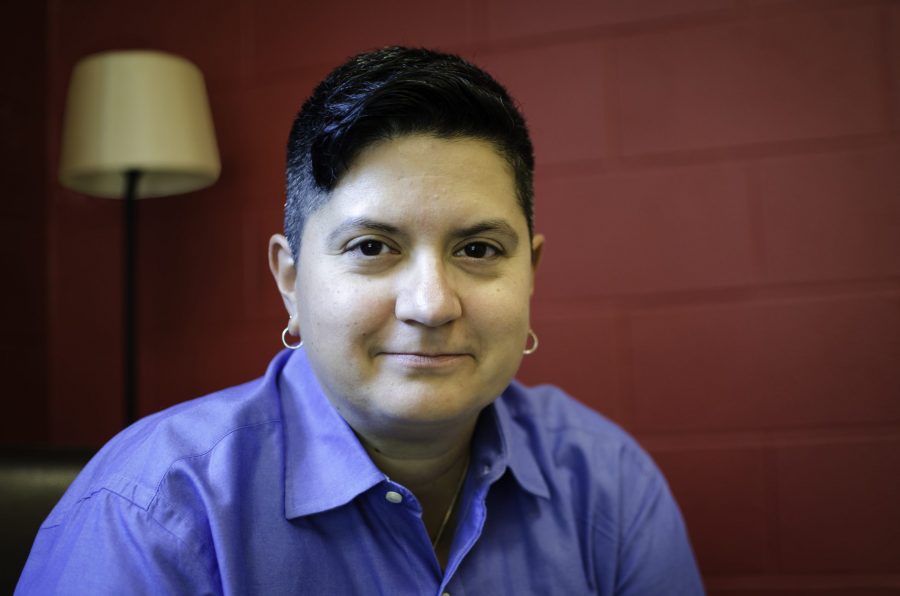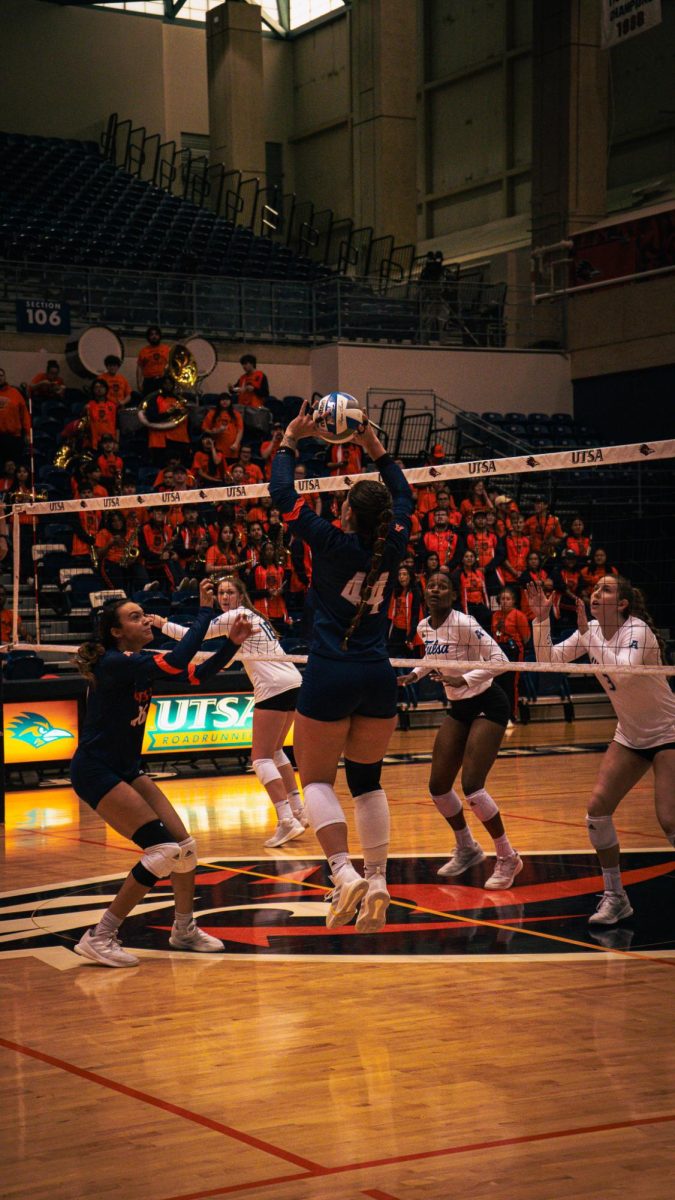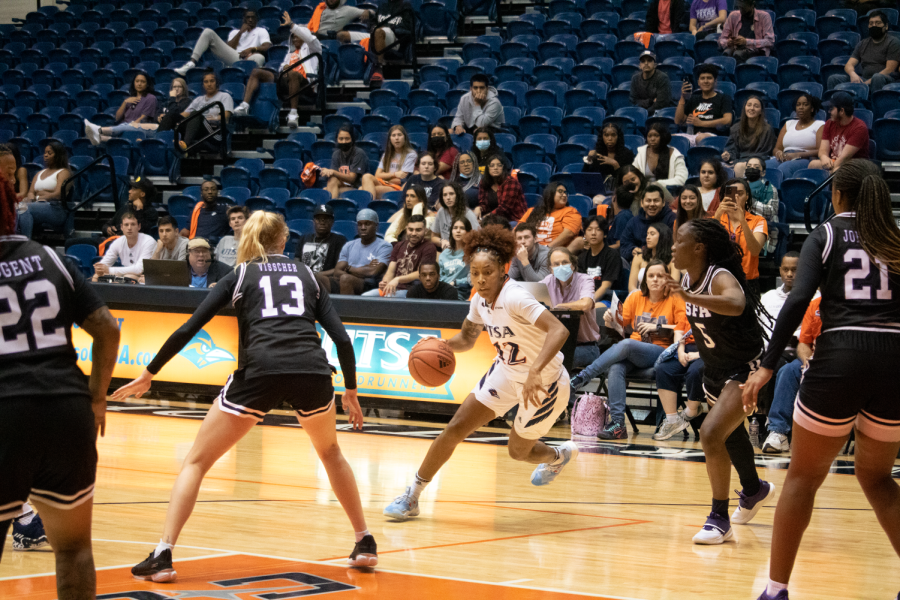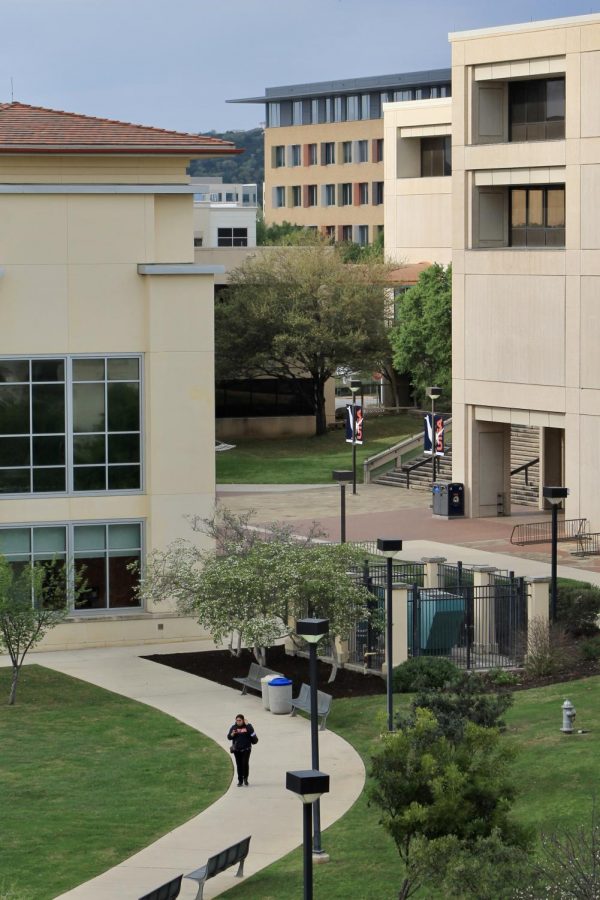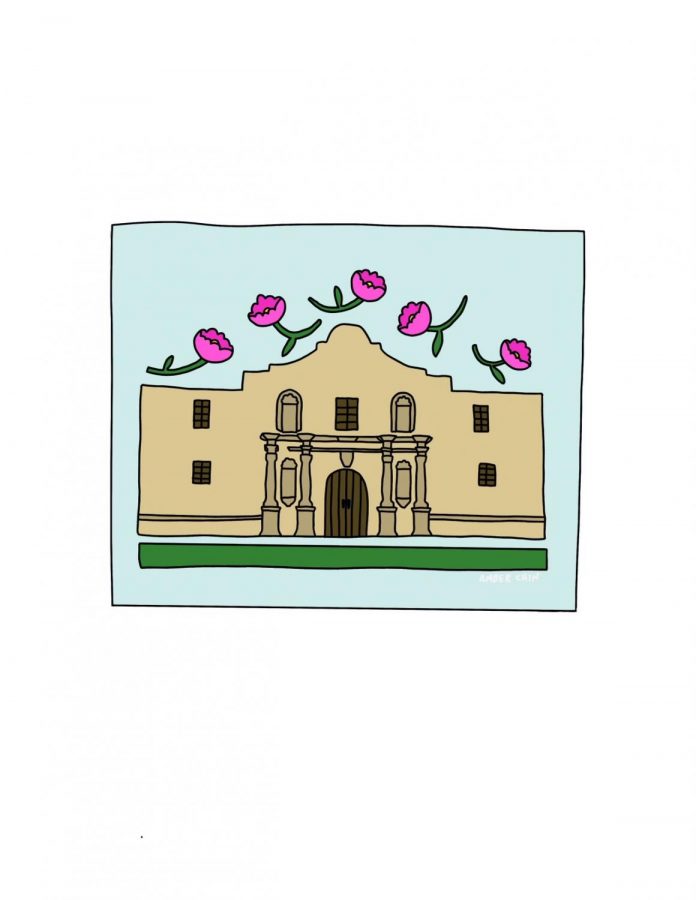UTSA professor Jackie Cuevas, Ph.D, teaches Chicana Feminist Writers, Mexican American Literature, Feminist Theory/Literary Theories, Introduction to LGBTQ Studies and much more, with most of her English courses cross-listed with Mexican American Studies and Women’s Studies.
In 2016, Cuevas was nominated for the UTSA President’s Distinguished Award for Teaching Excellence and the UT System Board of Regents Teaching Award. She is a faculty coach for PIVOT first-generation students.
Can you describe your journey as an undergrad?
“Oh dear, as an undergraduate I had a kind of convoluted but exciting journey; it wasn’t very straightforward. I was a very strong student, was accepted to several schools, got scholarships. I went to Brown University for a year and then wound up taking a break for some very complicated family reasons. I thought I was taking a year-long break, and I wound up taking a very long break, eventually going to A&M Corpus Christi in my hometown and graduating from there. I then immediately got my master’s degree. As an undergraduate, I would say I certainly would have benefited from knowing the things I’m learning about through the First-Gen program, especially being somebody who grew up poor; even though I had scholarships, it’s still very expensive to be a student and very challenging to get through undergraduate work. I had pressures to work and take care of a lot things that took me away from my focus on school… eventually I got back on the right path and went off to UT Austin for my Ph.D. in English. Now I’m doing what I love, which is teaching, researching, writing—and helping students.”
Can you describe a regular day growing up in your household?
“I was raised by my fabulous mother, who somehow magically kept things running on her own as a single mom. She made sure I learned responsibility with regular chores but also had the freedom to read, study and play baseball as much as I wanted.”
Can you describe your journey as a Latina woman in your professional career?
“The first thing that comes to mind …in my educational and career path, many fierce Latinas opened doors for me, mentored me, coached me and showed me how to navigate the very complicated terrain of academia. I definitely think about being Latina as one of my superpowers, one of my strengths that I bring to the table. Also it’s a topic of my research, since I study Latina/Latino literature and Latina/Latino studies, I’m a member of the culture I study, so it’s an endless fascination to understand what it means to be Latina, which is always shifting for me personally and culturally in a broader sense. I would say it’s definitely a difficult but beautiful journey. It’s not lost on me that there are not a lot of Latina faculty. Although UTSA is a Hispanic serving institution and we do have a good number of Latina faculty, across the U.S. academy there are not a lot of Latina faculty, especially tenured faculty, so I am very excited to be a part of a growing body of tenured faculty that we have at UTSA.”
What were consistent struggles or trials you went through throughout your professional career? As a woman or as a Latina?
I think there are definitely big challenges moving through the academy as a queer person of color, and those complications are many. I definitely cannot separate out the kinds of challenges that I’ve experienced as a Latina, as a woman, as a queer person, as a brown-bodied person, as a tejana, as someone who grew up poor aspiring to be working class who is now a professor. I can’t separate those things; they are all interconnected, and they all feed into the other, so it’s difficult to say that there is a particular thing I’ve faced. I think it’s also complicated that one of the roles I’ve chosen is to try to make inroads in the academy for diverse students, so the fact that I do embody a lot of different marginalized categories can put me at an advantage because I can speak to my experience and advocate
25
for people in ways folks in normative categories may not necessarily see.”
When is it that you found your passions and what are they?
“It’s a combination of always striving to be a better human and be of service to people, and along with that definitely my passions are reading and writing. As far as teaching, I found that early on when I was a teenager, and I took on a summer job tutoring students from wealthy families who could afford to pay me so that I could have a little cash and help out my family. Then I realized there was something I was good at that I could get paid for and was fascinated by that. Then when I was working on my master’s degree, I had some fabulous professors who hooked me up with an opportunity to teach composition classes, and I absolutely fell in love with teaching. I realized there was place in the world where I could be fully present and have really engaging conversations with people, helping them learn and helping them figure out how to better their lives. As far as writing, I’ve always written. I write creatively, and I write for my research. They are intertwined for me. I derive a lot of pleasure from writing, and I love teaching writing to students and working on my teaching and writing constantly.”
Was there a person in your life or an event that helped nurture your passions?
“Multiple ones, possibly too many to name. One in particular was meeting the author Sandra Cisneros and becoming a member of the Macondo writers collective, which she founded…that definitely was a big turning point in which I realize one of the things I benefit from is writing in a community and connecting with other writers who are socially engaged. I think in terms of teaching, there’s a long list of fabulous teachers, from my 2nd grade teacher, Mrs. White, to my 8th grade teacher, Mrs. Marvin, to great professors, mentors, who have all gone that extra mile to offer guidance. It’s certainly something I try to do for my students.”
Can you describe the work you did with Macondo?
“I was invited to join Macondo in 2004 and took creative writing workshops with some fabulous folks, such as Dorothy Allison and Luis Rodriguez. After a couple of years in the program, I participated in a workshop facilitated by Sandra Cisneros. A few years later, I co-taught a workshop with Alex Espinoza. Macondo has been a wonderful way to network and build community with other writers.”
Can you name other Latina women who helped guide you?
“I’ve been inspired by the writing and guidance of Norma Cantú, Ire’ne Lara Silva, and Anel Flores. Their writing moves me, and I admire their commitment to getting their work into the world.”
Can you describe the research you have done on gender and sexuality in Latina literature?
“I look at questions of gender and gender nonconformity. My most recent research looks at the representation of diverse and emergent identities. So I look back at canonical Latina literature to see questions of gender nonconformity, which has been present more so than we realize. I mainly look at contemporary literature to see what new authors are doing in today’s climate. My research looks at intersections between what it means to be Latinx and also move through the world in ways that push against the gender binary and harsh realities of gender normativity and the regulation of gender in our lives.”
When did you become a part of the feminist community/ movement?
“Being raised by a very strong single mother, who didn’t have a lot of financial resources but did an amazing job with the best she could, trained me to be a feminist thinker, somebody who questions authority and somebody who questions injustice. One of my earliest memories of becoming a feminist advocate for myself was insisting on being on a boys-only baseball team. As a teenager and young adult going to college and getting involved with feminist groups, I joined reading groups and activist groups on campus. Taking women studies classes definitely helped me think about my place in multiple feminist movements.”
What were your thoughts on the women’s march?
“I’m glad people are in the streets, especially people who were previously involved. As long as it’s an intersectional and inclusive feminism, then I’m down.”
When did you become involved with LGBTQ+ community?
“In my early 20s when I was taking women’s studies classes and thinking about what it means to be a feminist and how my queerness is political.”
What are your thoughts on recent queer and transgender social issues?
“LGBTQ+ folks and trans people of color in particular are being targeted by very scary and damaging policies. Growing up, when I realized I liked teaching, I wasn’t sure if I could be a teacher. When I realized I was queer, growing up in Corpus, at the time I grew up, I just wasn’t sure if it was going to be possible. Then I decided I was going to live a fabulous queer life anyway and once I met more out queer folks then decided that’s how I move through the world. It’s not necessarily surprising but disheartening that in this day and age people have to think about they could be fired for who they are.”
What are your hopes for the Feminist/Latina/LGBTQ movements?
“That we continue to demand a place at the table and we demand a bigger table be built.”
Is there anything else you’d like to say?
“I love my students at UTSA. I’ve enjoyed my time here, and I look forward to the adventures to come.”
Dr. Cuevas will be debuting her book “Post-Borderlandia,” which expands on Gloria Anzaldúa’s classic formulation of the Chicana as transformer of the “borderlands.”






